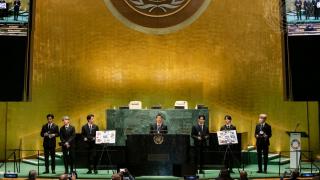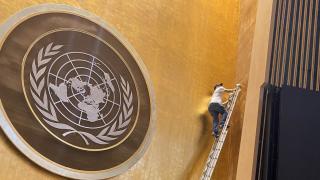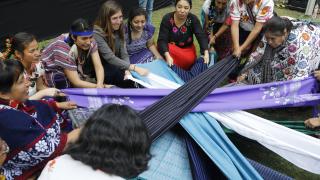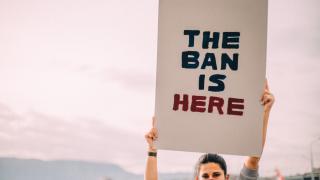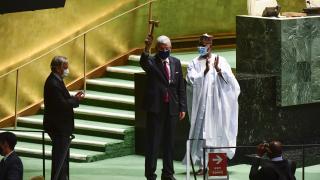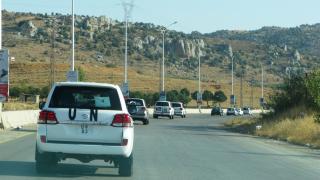
This article is part of our regular series of background briefings on the UN in the news.
It appears that yet another tragic, and illegal, chemical weapon attack has taken place in Eastern Damascus. This poses questions of our international system. Accountability for atrocities of this sort plays a vital part in discouraging their future use and in upholding the idea, now under threat, that chemical weapons have no role to play in modern warfare.
In our latest UN briefing we go through the options for international accountability when it comes to crimes of this sort. Sadly it is clear that none of these are likely to be viable in the short to medium term, although ensuring that evidence is retained for an eventual prosecution will be important in maintaining global abhorrence of chemical weapons.
The International Criminal Court
The International Criminal Court (ICC) is the world's foremost body for prosecuting atrocities. It is governed by a treaty, the Rome Statute, and its jurisdiction is therefore limited by that treaty. The ICC can only prosecute crimes if they were committed in the territory of a country that has signed the Rome Statute, if the crime was committed by a national of a country that has signed the Rome Statute, or if the UN Security Council refers the case to the prosecutor.
As Syria is not a signatory to the Rome Statute the UN Security Council would need to refer the case to the ICC. Any of the Security Council's five permanent members could veto such a move and, given that Russia has vetoed 11 attempts to mandate robust Security Council action on Syria, it is exceedingly likely that they would do so if an ICC referral was suggested.
An International Criminal Tribunal
The Security Council could establish a tribunal itself, as it did in the case of the International Criminal Tribunal for the former Yugoslavia (ICTY) and the International Criminal Tribunal for Rwanda (ICTR). This might help avoid some of the specific politics surrounding the ICC (the United States has also not ratified the Rome Statute) and could also be used to establish a wider jurisdiction (the ICC can only prosecute genocide, crimes against humanity, certain war crimes and crimes of aggression - the use of chemical weapons, particularly in this way appears to be covered, but a tribunal could potentially prosecute a broader range of acts of complicity).
Setting up such a tribunal might however undermine the idea of the ICC as the world's principal mechanism for international justice. Furthermore, Russia would be just as likely to veto the resolution establishing such a tribunal as they would an ICC referral.
A tribunal in the UK or another third-party state
Many countries, including the UK, operate the principle of "universal jurisdiction". This means that certain crimes, particularly serious human rights violations, can be prosecuted in UK courts no matter where they occur and no matter who the perpetrators are. Such countries would therefore be able to prosecute the perpetrators of a chemical weapons attack in Syria. However, most such countries - including the UK - require the accused to actually be present in the country so that charges can be brought against them. Only a small number of countries, including Spain, Belgium and Germany, allow the prosecution of "universal jurisdiction in absentia". A prosecution in absentia risks appearing tokenistic unless there is a serious possibility of any of the accused being extradited and thus facing real justice. On previous occasions even states that have pledged to uphold the rules based international system have failed to honour such extradition requests; the chances of perpetrators being extradited from Syria or its allies are slim.
Nevertheless, the threat of universal jurisdiction cases being brought, and the consequential restrictions that are placed on perpetrator's travel plans, remain important for upholding international standards for accountability. This was recently made clear by the UN High Commissioner for Human Rights, Zeid Ra’ad Al Hussein, when he called on all states to investigate the possibility of bringing universal jurisdiction cases against alleged perpetrators of war crimes in Sri Lanka.
An ad-hoc or hybrid Tribunal
Any country or group of countries can come together to establish a tribunal. These can take the form of an ad hoc grouping of countries (as with the Nuremberg trials), a regional mechanism (such as the Extraordinary African Chambers established by the African Union to try former Chadian President Hissène Habre in Senegal), a hybrid mechanism between national and international bodies (such as the Special Court for Sierra Leone which was set up between the UN and the Sierra Leonean Government) or bespoke arrangements for special or shared jurisdictions between nations (such as with the Scottish High Court of Justiciary, sitting in the Netherlands - otherwise known as the Lockerbie trial).
For such a mechanism to work, at least one of the parties involved in the tribunal would need to have jurisdiction over the case. Under the principle of universal jurisdiction this is fairly straightforward. The other parties to the tribunal then serve to add political weight and legitimacy to the project and to widen the net suspects could fall into. In the case of Syria this is where it gets difficult. Any UN involvement would run up against the same issues that preclude an ICC referral, and many of the conflict's stakeholders and the nations suspects might travel to would, as a consequence, be wary of joining up to such a process. This means that any such mechanism risks offering little more than a trial held under universal jurisdiction. Further, any mechanism without UN involvement risks undermining the legitimacy and credibilty of internationally agreed mechanisms such as the ICC.
The Arab League, which carries significant regional legitimacy, has signaled some support for international justice mechanisms to be bought to bear in Syria. They could provide a useful partner, and should at very least be consulted in any eventual process.
An OPCW investigation or joint investigative mechanism
As set out in one of our previous UN briefings, the Organization for the Prohibition of Chemical Weapons (OPCW) has the power to investigate the use of chemical weapons and could suspend a state from membership of the Chemical Weapons Convention.
The OPCW could not themselves bring criminal charges to bear, but could form part of a joint investigative mechanism with the UN in order to identify perpetrators. This is precisely what happened between August 2015 and November 2017 in the form of the OPCW-UN Joint Investigative Mechanism (JIM). It had a mandate:
to identify to the greatest extent feasible individuals, entities, groups or governments who were perpetrators, organizers, sponsors or otherwise involved in the use of chemicals as weapons, including chlorine or any other toxic chemical, in the Syrian Arab Republic where the OPCW fact-finding mission determines or has determined that a specific incident in the Syrian Arab Republic involved or likely involved the use of chemicals as weapons
Russia vetoed the renewal of the mandate of the JIM in late 2017 and would unfortunately be likely to veto any such future move.
The OPCW has already played a very significant role in the conflict when, in 2013, it worked closely with the UN Office of Disarmament Affairs to dispose of much of Syria's chemical weapons stocks. As Edward Mortimer argued in an article for UNA-UK magazine, while much commentary at the time was focused on President Obama’s failure to enforce his own “red line” on the use of these weapons through military action (and the parallel vote on the issue in the UK), in actual fact the UN and OPCW were able to broker a compromise under which the vast majority (believed to be around 99%) of Syria's chemical weapons stocks were destroyed. While it is clear that some survived, with catastrophic consequences for Syria's civilians, it is at best unclear that military intervention would have achieved this degree of safe stockpile reduction, and many lives were saved by the fact that Syria has so few chemical weapons remaining.
A Human Rights Council investigation
The UN Human Rights Council has the ability to order investigations into grave human rights violations. In 2011 they did this, establishing the Independent International Commission of Inquiry on the Syrian Arab Republic, a body whose work continues to this day. The Commission of Inquiry can, and doubtless will, investigate the use of chemical weapons. However, inquires of this sort are not criminal, they cannot name names, or even establish that crimes have taken place. The most such an inquiry can say - as it frequently has in the case of Syria - is that "such acts, if established in a court of law, may constitute war crimes and crimes against humanity, and give rise to individual criminal responsibility".
Nevertheless, such investigations are important in making sure the international system retains its focus, and that chemical attacks are clearly identified as being in violation of international law. Human Rights Council investigations also serve to safeguard evidence, and so pave the way for eventual prosecutions.
Photo: The UN-OBCW JIM team arrives in Damascus to look for chemical weapons UN Photo/Hend Abdel Ghany

